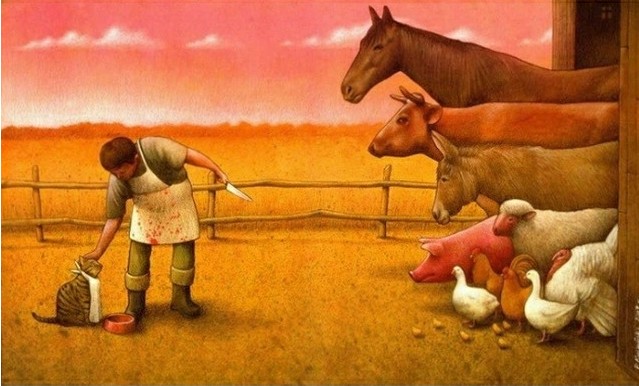
One of the scanty pleasures of this pandemic has been the opportunity to loose oneself in the cavernous reservoir of YouTube videos. A favorite indulgence of mine are debate videos, which carry a quaint appeal to a bygone era of town hall intellectual jousting.
Recently, the witchcraft of analytics corralled my attention to a debate between two YouTubers, Cosmic Sceptic (aka Alex O’Connor) and Smokey Saint, over the following topic: should veganism be morally obligatory (https://m.youtube.com/watch?v=5Akfb6liZtI&t=2761s).
Now I must admit to being a big admirer of O’Connor, whom I regard as a brilliant young public intellectual. Despite, indeed because, of this, I was doubly sure to remain objective on an issue I deem borderline self-evident.
Having listened to the debate twice-spoiler, Alex won-I have come to the following conclusion: the argument for the moral necessity of veganism is unassailable.
No, this isn’t the part where I simply regurgitate said argument for what it’s worth. Rather, I will state, in my estimation, the strongest arguments against veganism and provide O’Connor’s rebuttal.
First, some house rules: veganism does not require the elimination of animal suffering; rather, as O’Connor illuminates, it refers to the “minimization of animal suffering to the fullest extent practicable.”
This is a highly nuanced definition for two reasons: 1, it incorporates Jeremy Bentham’s insuperable line of sentience, or the ability to feel pain, to determine the moral worth of non-human animals; and 2, pre-empts the charge of absolutism.
Hence, this dismisses the starving vegan on a deserted Island hypothetical whereby the vegan presented with a choice between eating his pet dog to survive or death would invariably choose the former.
The answer here is one of mitigating gratuitous pain to the extent permitted by one’s circumstances.
Argument 1: human animals are qualitatively different from non-human animals. There is simply no moral reason why we should accord rights, including the right to be free from suffering, to non-human animals without the concomitant obligations or responsibilities, which is the essence of human ethics.
This argument suffers from imposing an ethical framework that has no basis in the non-human animal realm. While human ethics are driven to an extent by reciprocal rights and responsibilities, this cannot extend to non-human animals incapable of understanding rights, much less, discharging the attending obligations.
To argue otherwise would be to deprive some human animals, such as children, the mentally handicapped, and even some of the elderly, from the right to be free from pain as they similarly lack the cognitive ability to grapple with the concept of rights and obligations.
They have this right despite the qualitative differences because there is no good reason to deny it to them.
Argument 2: Industrialised farming of non-human animals is pretty bad, but vegan food is just simply far below the acceptable standard of human taste to be widely adopted.
Moreover, I am not personally or directly involved in causing the suffering of such animals.
A common blind spot of veganism detractors is their failure or refusal to acknowledge the inconceivable scale of destruction wrought by animal agriculture.
A cursory examination of the literature will demonstrate that factory/industrialised farming is responsible for colossal animal suffering via the: forced and indefinite separation of calves at birth, maceration of male chicks, suffocation of pigs from confined spaces, gassing, electrocution and bolt gun shooting to the back of the heads of livestock.
The number of animals bred to be killed by one of the above methods is mind boggling: “Nearly 100 billion humans have ever existed on planet earth, and we are approaching that number of non-human animals being slaughtered every single year to satiate our addiction to their flesh and secretion.”
In addition, factory farming is responsible for unending environmental disaster, antibiotic resistance, and will likely precipitate future pandemics worse than Covid.
By paying for and consuming the products churned out from these factories, every non-vegan is obliquely complicit in the cost of doing business; and, for some, this mayhem is justifiable on grounds of taste.
Argument 3: Surely, limiting one’s consumption of animal products to ethical sources should suffice, if the minimization of animal suffering is the endgame.
The classic good versus bad farms argument overlooks the sheer difficulty of identifying animal products that come from an ethical source especially given the nebulous regulations in this space. Moreover, over 99% of animal products come from factory farming in the U.S, and high percentages exist in other developed nations.
The fact remains that “endemic to any form of farming is the exploitation of animals” especially where the profit motive is a core driver.
Case in point: free range chickens can still be housed in 9 inches per square meter barns. In the egg industry, both industrialised, organic farming, and free range, “males are culled at birth by either suffocation or being tossed into an industrial macerator, or humanely gassed.”
To say nothing of cows that have to be forcibly impregnated to produce milk amid the psychological distress of being separated from their calves.
Argument 4: What about animals killed by commercial vegetable production, isn’t there an internal contradiction in valuing the life of a livestock or pig more than, say, a wild hog upending the top soil of a plant?
One could justify the killing of animals during commercial vegetable production using a utilitarian ethic, in so far as their death would preclude an exponentially greater number of suffering and killing in commercial animal agriculture.
Even absent the foregoing, the force of this point is undermined by the use of the majority of commercial vegetable production to feed livestock, especially in factory farms.
Argument 5: Factory farming is far too entrenched in the global economy to be uprooted overnight. There are simply too many vested interests. Moreover, what do we do with all the animals upon mass closures of factory farms?
This is the old argument from practicality. Fortunately, history demonstrates that even the most enmeshed industry must yield to the realities of supply and demand. A gradual and sustained reduction in the demand for animal products will reduce the need to breed animals into existence for human consumption.
This will not happen overnight, but the pace of change would not justify the continuation of animal suffering. Indeed the difficulty of the task makes the change even more pressing.
The same applies for the animals already in the system. A gradual cessation of demand for animal products will preclude the breeding of said animals into existence.
The notion of humans being overrun by animals is fanciful and frankly contradicts the risible argument that factory farming is necessary to stave of extinction for some animals.
One could redirect Governmental subsidies provided to factory farms to animal sanctuaries and conservation centres or euthanize some animals to prevent future suffering, which would comport with the vegan principle of minimizing pain.
The conclusion is inescapable: adopting veganism is a moral necessity. And while there may exist stronger arguments to the contrary, I doubt they would move the needle, especially given our current existential predicament.
One thought on “The Moral Necessity of Veganism”
Leave a Reply
You must be logged in to post a comment.





I don’t believe I can live without meat! The bible also suggests otherwise